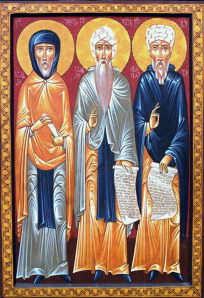 Expedient is the word that I speak and worthy of acceptance:
Expedient is the word that I speak and worthy of acceptance:
Let us now awake from our sleep (Rom.13:11),
and lift up both our hearts and hands to God towards heaven;
lest suddenly the Lord of the house come, that when He comes He may find us in watchfulness (Luke 12:37).
Let us observe the appointed time of the glorious bridegroom (Matt. 25:4, 10), that we may enter with Him into His bride-chamber.
Let us prepare oil for our lamps that we may go forth to meet Him with joy.
Let us make ready provision for our abiding-place, for the way that is narrow and strait.
And let us put away and cast from us all uncleanness, and put on wedding garments.
Let us trade with the silver that we have received (Matt. 25:21), that we may be called diligent servants.
Let us be constant in prayer, that we may pass by the place where fear dwells.
Let us cleanse our heart from iniquity, that we may see the Lofty One in His honour.
Let us be merciful, as it is written, that God may have mercy upon us (Matt. 5:7).
Let there be peace amongst us, that we may be called the brethren of Christ.
Let us hunger for righteousness, that we may be satisfied (Matt. 5:6) from the table of His Kingdom.
Let us be the salt of truth, that we may not become food for the serpent.
Let us purge our seed from thorns, that we may produce fruit a hundred-fold.
Let us found our building on the rock (Matt. 7:24), that it may not be shaken by the winds and waves.
Let us be vessels unto honour (2. Tim. 2:21), that we may be required by the Lord for His use.
Let us sell all our possessions, and buy for ourselves the pearl (Matt. 13:46), that we may be rich.
Let us lay up our treasures in heaven (Matt. 6:20),. that when we come we may open them and have pleasure in them.
Let us visit our Lord in the persons of the sick (Matt. 25:33-35), that He may invite us to stand at His right hand.
Let us hate ourselves and love Christ, as He loved us and gave Himself up for our sakes (John 12:25; Eph. 5:2).
Let us honour the Spirit of Christ, that we may receive grace from Him.
Let us be strangers to the world (John 17:14), even as Christ was not of it.
Let us be humble and mild, that we may inherit the land of life.
Aphrahat the Persian (c.270-c.345): Demonstrations, 6 – On Monks. (The icon accompanying this extract depicts Ephrem the Syrian, Isaac the Syrian, and Aphrahat.)









